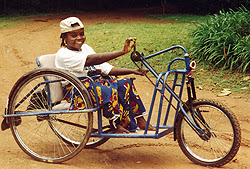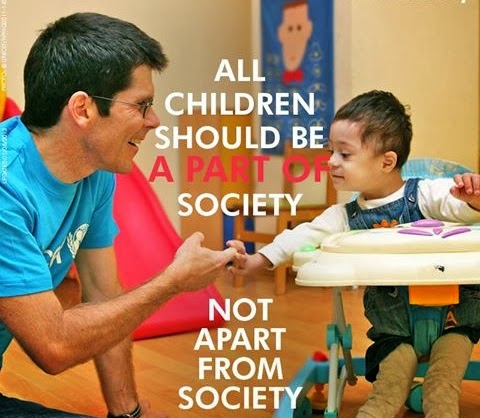Lilian Isedeh's blog
" THE LEARNING DISABILITY BLOG " Share informations, Experiences, awareness, the latest on researches, alternative treatments, and info on all forms of learning disability.
Friday, 10 January 2014
Tuesday, 24 December 2013
Tuesday, 17 December 2013
Dyslexia in a Hub
Dyslexia is difficulty in learning to read, write, spell, or even speak. It has been defined in different ways. For example, in 1968, the World Federation of Neurologists defined dyslexia as "a disorder in children who, despite conventional classroom experience, fail to attain the language skills of reading, writing, and spelling commensurate with their intellectual abilities."
Dyslexia appears to be the most common learning disability in children and can persist through life. It has been around for a longtime, and can be related to hormonal influences, heredity or brain injury, the inability to translate images received from the eye or ears into understandable language. However it does not result from vision or hearing problems, it is not due to mental retardation or lack of intelligence.
The severity of dyslexia can vary from mild to severe. The sooner dyslexia is treated, the more favorable the outcome, it is never too late for people with dyslexia to learn to improve their language skills. Letter and number reversal is one of the common signs of dyslexia and can be diagnosed by reviewing a child's processing of information from seeing, hearing and participating in activities.
Dyslexia can go undetected in the early ages of schooling. Children can become frustrated by the difficulty in learning to read, and other problems can arise that disguise dyslexia. They may show signs of depression and low self-esteem. Behavior problems at home, as well as at school, often manifest. Children may become unmotivated and develop a dislike for school, and their success there may be jeopardized if the problem remains untreated.
Primary dyslexia, secondary dyslexia, and trauma dyslexia are believed to be the three main types of dyslexia that can cause these impairments:
- Primary dyslexia is generally considered hereditary and probably afflicts more men than women. Experts think this type of dyslexia happens because of a left-brain dysfunction. Many people with this type of dyslexia will be able to learn to read, spell, write, and perform basic mathematics problems, but will generally never be able to progress beyond the level of a normal nine or ten-year-old child.
- Secondary dyslexia is a type of dyslexia that is believed to occur due to problems in early childhood or even fetal development. It is also believed to affect more men than women. With specialized education techniques and training, many people with secondary dyslexia find their impairments greatly diminished by the time they reach adulthood.
- Trauma dyslexia is a type of dyslexia that can affect those who suffer trauma to the reading and writing centers of the brain. It usually only occurs after an injury to the head, and is therefore usually more common in adults than in young children.
Wednesday, 11 December 2013
Rights of people living with disability included
As Nigeria marks the 2013 Human Rights Day....
Lagos State is set to redesign public infrastructures to accommodate wheelchair access for disabled persons
Lagos State Governor, Babatunde Fashola (SAN) has announced plans to redesign all public infrastructures to make them wheelchair accessible.
In his address to mark the 2013 World Human Rights Day celebration with the theme " Rights of People Living with Disabilities" and Human Rights Essay and Debate Competition for Private and Public Schools at Adeyemi-Bero auditorium, Alausa, Ikeja.
The governor, who was represented by the state's Attorney General and Commissioner of Justice, Ade Ipaye pointed out that the protection of rights is all inclusive involving the government and private individuals. He said the state has already passed the Special People's Law in 2011 into law to address the challenges being faced by people living with disabilities, the law was also intended to safeguard them against all forms of discrimination and equal opportunities in all aspects of living in the society.
Fashola said the state had provided that the physically challenged enjoy equal opportunity in terms of employment stressing, "the state is an equal opportunity employer without discriminating against prospective employees on the ground of physical infirmity. He said that not less than four state counsels who are physically challenged have been employed in the ministry of justice alone,pointing out that they are performing excellently well in office and that the state had put measures in place to ensure that at every public parking lots, at least one out of 20 parking lots is properly marked and reserved for persons living with disability.( thumpsup)
Tuesday, 10 December 2013
Learning disability in its world
What is
learning disability?
Learning
disability is a general term that describes specific kinds of learning
problems, a neurological disorder. Learning disability can cause a person to
have trouble learning and using certain skills.
The skills most often affected
are:
Reading,
Writing,
Listening,
Speaking,
Reasoning,
and
Doing
math.
Learning disabilities (LD) vary from person to
person. One person with learning disabilities may not have the same kind of
learning problems as another person with learning disabilities. Researchers
think that learning disabilities are caused by differences in how a person's
brain works and how it processes information. Children with learning
disabilities are not "dumb" or "lazy." In fact, they
usually have average or above average intelligence. Their brains just process
information differently.
Subscribe to:
Posts (Atom)



